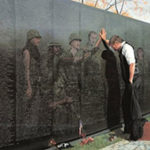*The Following Article was published in “The Highground” Magazine in 1993 in the second edition.Â
The Moving Wall
As it moves around the country, the wall moves something in all of us.
By: Frank Smoot
         During its weeklong visit in Peoria, Illinois, someone left a 1965 dime at the “Moving Wall.†The note with the coin explained that a soldier had given it to a buddy whose tour was almost up, so that, when he returned stateside, he could give the soldier’s folks a call.
         But even before his buddy could get out, the soldier was killed, so the call was made in person, the dime given as a token. More than twenty years later, the coin—-and the message its symbolized—-made it almost full circle, as it lay in front of that now-silent soldier’s name etched on the Moving Wall.
         The traveling, half-size replica of the Vietnam Veterans Memorial in Washington, D.C., gathers many such relics (along with poems, letters, notes and flowers) on its journey eight years long and still continuing.
         The Moving Wall was conceived in 1984 by a group of Vietnam Veterans from California (now organized as Vietnam Combat Veterans, Ltd.), and, after an uphill battle to gather support for the idea, it took to the road in 1985. Since then, it has journeyed to perhaps 300 cities in all 50 states. Speaking in Baton Rouge, Louisiana, Moving Wall founder John Devitt said, “Originally we thought we’d be done touring within a year . . . . but from the start there was immediately another town 10 miles away that wanted it. It brought the spirit of the 58,000 who died in Vietnam home to their homes, and I think that’s where the impact comes.â€
         The aluminum and Plexiglas memorial lists the more than 58,150 names of those killed and missing in Vietnam from 1959 through 1975. Although the names are only a half-inch high and run about a half-dozen per line, the list stretches through more than 140 six-foot-tall panels. Side by side, the panels stretch for more than 250 feet.
         Not only has the Moving Wall toured many cities but also attracted huge and respectful crowds everywhere it’s gone. The week the memorial visited Peoria, Illinois, in 1990, some 15,000 people visited per day, over 100,000 for the week. Local superintendent of parks John Potter told the Peoria Star Journal,†normally there would still be 100 people there at three in the morning. That would fall off to just individuals until the first light, and then the numbers would be right back up.†(Even with 100,000 visitors, he added, there was never any litter, and park crew’s “cleanup†consisted of raking some mulch smooth again.)
         Of the tremendous outpouring of visitors the memorial finds at each stop, Devitt said, “I think it shows that the people of this country really do care and they really do understand the process of freedom: living here isn’t free; it’s a continuous daily commitment.â€
         When the Moving Wall comes, local volunteers unload the panels and set up the memorial. Several Baton Rouge volunteers mentioned that it was as if they were bearing the bodies of their friends to a resting place and place of honor. They also become part of the process of healing the memorial brings across America. Says Devitt of his own role, “It’s a rewarding job, just seeing what it does in each place. I don’t think there’s a job any better for the reward you get from it.â€
         Other volunteers man the site during the memorial’s week-long stay —- and help visitors find particular names, if the need be. That, in itself, is a challenging process. A person staffs an alphabetical master-list of names, and gives the visitor a location code. Other volunteers stand ready near the wall to match the code number with the panel on which the name is indelibly engraved.
         Journal Star reporter Jean Budd Wright came to the Moving Wall looking for a particular name. After she found it, with the help of the staff, she was still left with questions: “There it was. Why was locating it so important to me? My chest swelled. I choked back the tears. I ran my fingers over his name. It was cold but undisturbing. Why did I touch it? I don’t really know. But, by touching, I felt this calm come over me, this contentment envelop me.â€
         Touching the Moving Wall is a nearly universal response. Beyond that, people find their own ways of communing with the memorial. Some walk its length in silence. Others stand and weep. Others make their visit a family outing, letting their children learn the memorial’s lessons. Many, as we said, leave tokens, all of which are catalogued, put in plastic bags and sent to San Jose, California, where Vietnam Combat Veterans, Ltd., is planning a museum for them.
         Some veterans have even been reunited with buddies from the war. At Baton Rouge, while Louis Reason sat at the Moving Wall in his wheelchair, his friend Wem Ballard walked up. The two hadn’t seen each other since Reason stepped on a mine while they were serving with the 25th Infantry, Alpha Company, 1st Platoon. “It’s like {seeing} a brother you hadn’t seen for twenty years,†said Reason. Ballard answered, “I see an old friend, an old, old friend.â€
         When the Moving Wall leaves again, many feel a long rush of sadness but know that part of the memorial stays on. As one person wrote to the Vietnam Veterans of Illinois Newsletter, “All around I hear hearts being torn down. The clank of metal as the supports on the Wall’s black panels are loosened and lowered. The wind carries the last few whispered ‘Good-byes’ and ‘I love you’s . . . . I will miss the silent soldiers as they stood staring —- their bodies in front of me, their hearts with their comrades, and their memories rambling back 18 years remembering pacts and promises . . . . We welcomed you with open arms and send you on to do a job in the next stop. A job of healing, understanding, and self-forgiveness. But only the Wall leaves, not the names or feelings. You have helped each person who reached out and asked and many who didn’t need to ask. You have reunited friends, taught our children, and started a fire in our souls that will save another generation from going through what you all went through.â€
         After seeing the Moving Wall, many veterans describe the ways in which the memorial speaks to them, the ways in reaches out and touches them. Dewitt himself sees the observe: “I think the Wall is basically pretty silent. I think the people on that wall have found their peace. It’s us that are crying out to it, to them.†He could surely add that, in its presence, we reach out to each other.
Additional research by—and many thanks to—Joe Hajny,
Vietnam Veterans of Illinois Newsletter
“You Are Not Forgottenâ€
What follows are a few of the reflections, thoughts, and missives left at the Moving Wall in Peoria, Illinois, and Baton Rouge, Louisiana. We use first names or initials only; those without names below were left unsigned.
- “To my father, killed, whom I never knew. I was only 8 months old. You will always be remembered, never forgotten. Thanks for just being my father and serving our country.â€
—- N.S.B., USMC
- “I may not have known anyone on the wall, but I cried when I saw the wreath ‘Dear Dad’.â€
- “As a Vietnam vet I believe I’ve felt every emotion possible while at the wall & finding my friends’ names —- please keep displaying it —- I finally feel some resolve & feel lighter. Thanks.â€
—- Tom
- “It’s been a long time. I ain’t looking over my shoulder much. But this really means a lot to me . . . . They did their best. So did I. They’re dead. I will carry their load all my life. Some of them died on my orders. I was a squad leader.†                 Â
—- Lucas, USMC
- “At the time I watched him die, you weren’t allowed to cry. You had to be strong. I waited twenty years to cry.â€
- “My cousin lost his life in the war. It’s such a shame for all these young men and women to never have a real chance at life. This is a very moving experience. I pray that God will be with every parent and give them peace. Be proud; these guys loved our country.â€
—- Sheree
- “I reached out and put my hand on your name, and it was as if I could feel your hand touching mine. I have been to Beardstown many times to put a flag where you’re resting. Boy, I sure miss you.â€
—- Bob
- “We remember. You are not forgotten.â€

